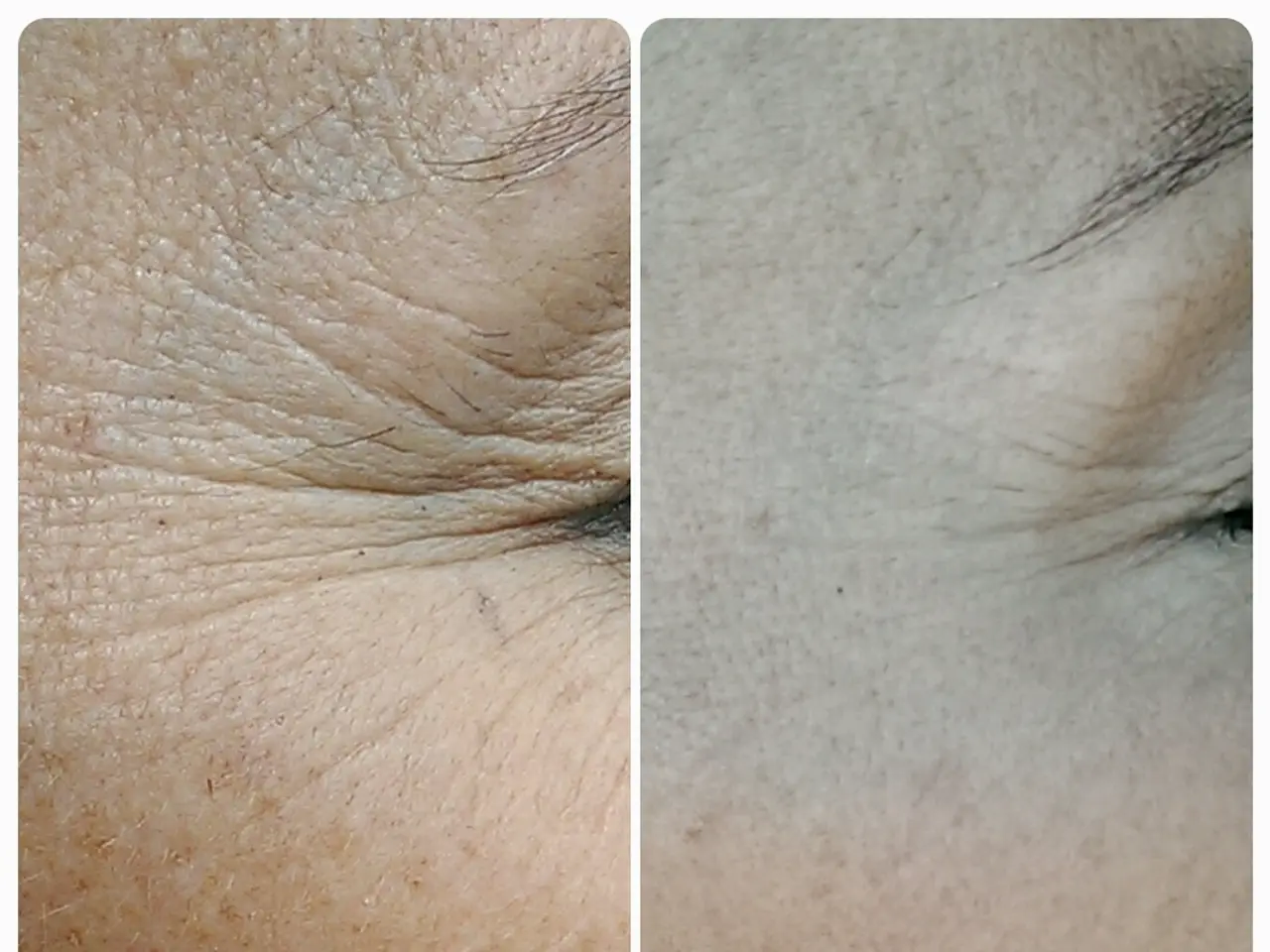Pushing the limits of cosmetic effectiveness: The integration of AI in dermatology
In the world of cosmetics, a groundbreaking development is taking place at the intersection of artificial intelligence (AI) and dermatology. This fusion is driving personalized skincare, precise skin diagnosis, and innovative product development, transforming the industry as we know it.
Provital, a leading company in the field, is spearheading this revolution with their latest innovation, Altheostem™. This senescence catalyst, powered by AI, is designed to remove senescent cells from the skin, contributing to healthy aging evidence[1].
One of the key applications of this technology is AI-powered skin diagnosis and personalized recommendations. AI models, trained on thousands of dermatologically validated images, can accurately analyze skin patterns such as acne, pigmentation, and fine lines, delivering tailored skincare product recommendations based on an individual's unique skin condition, age, and lifestyle factors[2][3].
Another trend is the development of personalized cosmeceuticals. Emerging innovations use AI-driven diagnostics, gene expression profiling, and skin microbiome sequencing to create customized hyaluronic acid (HA) formulations, addressing specific skin issues like dehydration, sensitivity, or premature aging[2].
Virtual try-ons and augmented reality (AR) are also becoming commonplace. AI combined with AR allows consumers to virtually test makeup products on their own skin tone before purchase, enhancing consumer confidence and engagement[3].
AI is also playing a significant role in smarter product development. By analysing massive datasets of ingredients, clinical data, and user reviews, AI can optimize cosmetic formulations, predict ingredient interactions, and reduce trial-and-error in product innovation[3].
In the realm of clinical dermatology, AI systems are outperforming dermatologists in identifying facial pigmented lesions and other skin diseases, enabling earlier and more accurate detection and supporting treatment decisions like laser therapy[4][5].
The combination of AI and dermatology in cosmetics is leading to highly personalized, data-driven skincare and cosmetic solutions. This integration of deep dermatological expertise, genetic insights, and consumer data is redefining anti-aging, treatment, and beauty regimens[1][2][3][5].
Provital's Altheostem™ is a prime example of this, allowing brands to develop predictive and highly selective facial care. The system, which uses in vivo testing and machine learning based on Artificial Intelligence, compared the apparent visual age of volunteers before and after the use of Altheostem™. The results were striking, with volunteers treated with Altheostem™ showing a reduction of more than 3 years in their apparent visual age compared to those treated with placebo[1].
The system, which analysed 223,560 images of 70 volunteers aged 45 to 65, was trained using 55,134 images of 13,617 subjects aged 16 to 77. The study also used 207 videos showing the evolution of subjects during the different stages of treatment[1].
Moreover, the system is capable of predicting the age of subjects in a controlled environment, opening the door to remote medical consultations[1].
As we move forward, the integration of AI and dermatology in cosmetics is rapidly evolving with ongoing research and commercial adoption. This promises more effective, tailored, and accessible skin health solutions for all[1][2][3][5].
References: [1] Provital. (2021). Altheostem™: The AI-Powered Revolution in Skincare. Retrieved from https://www.provital.com/en/innovation/altheostem-ai-powered-revolution-in-skincare/
[2] Cosmetics Design Europe. (2020). Personalized skincare: The future of beauty. Retrieved from https://www.cosmeticsdesign-europe.com/Article/2020/06/09/Personalised-skincare-The-future-of-beauty
[3] McKinsey & Company. (2020). The beauty industry goes digital: How AI and big data are transforming the way we shop and make products. Retrieved from https://www.mckinsey.com/industries/consumer-packaged-goods/our-insights/the-beauty-industry-goes-digital-how-ai-and-big-data-are-transforming-the-way-we-shop-and-make-products
[4] Nature. (2019). Artificial intelligence outperforms dermatologists in diagnosing skin cancer. Retrieved from https://www.nature.com/articles/s41586-019-1666-5
[5] Forbes. (2020). The Future Of Skincare: How AI Is Changing The Industry. Retrieved from https://www.forbes.com/sites/forbesagencycouncil/2020/09/14/the-future-of-skincare-how-ai-is-changing-the-industry/?sh=60a395d2117c
Artificial Intelligence (AI) is not only advancing clinical dermatology by outperforming dermatologists in identifying facial pigmented lesions and other skin diseases [4][5], but it is also revolutionizing personalized skincare. AI models, trained on thousands of dermatologically validated images, can analyze skin patterns such as acne, pigmentation, and fine lines, delivering tailored skincare product recommendations based on an individual's unique skin condition, age, and lifestyle factors [2][3].
Provital's latest innovation, Altheostem™, is a testament to this, providing brands with predictive and highly selective facial care. The system, powered by AI, compares the apparent visual age of volunteers before and after the use of Altheostem™, revealing a reduction of more than 3 years in their apparent visual age compared to those treated with placebo [1].




